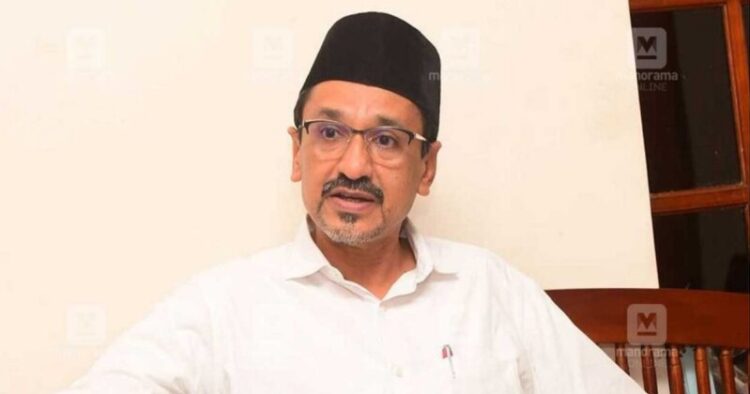The President of the Indian Union Muslim League (IUML) and a prominent Muslim spiritual leader, Panakkad Sayid Sadiq Ali Shihab Thangal, has sparked controversy with his recent statements asserting that the construction of the Ram temple and the proposed Babri Masjid in Ayodhya will strengthen secularism in India.
Speaking at a party program in Manjeri, Malappuram district, Thangal acknowledged the reality of the Ram temple, revered by the majority in the country, emphasizing that there is no need to protest against it as it was constructed based on a court order. He stated, “These two are part of India. Ram temple and the proposed Babri Masjid will strengthen secularism in our country.” Thangal also mentioned that while the Indian Muslim community had protested against the demolition of the Babri Masjid by karsevaks, they dealt with the situation in a mature manner.
The video of Thangal’s speech, reportedly delivered on January 24, 2024, gained attention when it went viral on February 4. Thangal’s remarks come at a time when the construction of the Ram Mandir in Ayodhya and discussions surrounding the proposed Babri Masjid have been significant topics of debate.
The controversy ensued when a video of Thangal’s speech, wherein he expressed views on the construction of the Ram temple and the proposed Babri Masjid in Ayodhya, went viral. Thangal asserted that both the Ram temple and the Babri Masjid would strengthen secularism in India, emphasising the need to move past protests against the temple construction, which was based on a court order.
In response to Thangal’s comments, the Indian National League (INL), a splinter group that parted ways with the IUML over differences regarding the Ayodhya controversy, criticised Thangal’s stance. NK Abdul Azeez, an INL state secretariat member, highlighted the distinction between the spiritual Hindu religion and the political Hindutva ideology of the Rashtriya Swayamsevak Sangh (RSS), accusing political leaders of misleading their followers.
Thangal’s IUML is a key ally of the Opposition Congress-led United Democratic Front (UDF) in Kerala, contributing significantly to the coalition’s support base, particularly among the Muslim community. Consequently, Thangal’s remarks drew swift reactions from both the Congress and IUML leaders, with V.D. Satheeshan, Leader of the Opposition in Kerala Legislative Assembly, and P.K. Kunjalikkutty, senior IUML leader, defending Thangal’s statements.
Kunjalikkutty clarified that Thangal’s words were misinterpreted, while Satheeshan praised Thangal for attempting to prevent tensions and divisive campaigns in society. The support from Congress and IUML leaders underscored the political significance of Thangal’s position within the UDF coalition, especially in the context of the upcoming Lok Sabha elections.
However, the controversy also highlighted the growing ideological rift within the state’s political landscape, with the INL, a constituent of the ruling Left Democratic Front (LDF), challenging the IUML’s stance on the Ayodhya issue. The INL’s critique of Thangal’s remarks signalled potential tensions within the LDF coalition and posed questions about the CPM’s response to the controversy.
While some sections of society welcomed Thangal’s comments as a reflection of maturity and a desire to foster harmony, others criticised the IUML president for allegedly capitulating to political pressures and compromising on principles. The broader implications of Thangal’s statements on communal harmony and political dynamics in Kerala remain subjects of intense debate.
Overall, the controversy surrounding Thangal’s remarks underscores the complexities of religious and political narratives in Kerala, as various factions navigate the delicate balance between secularism, identity politics, and electoral considerations.




















Comments